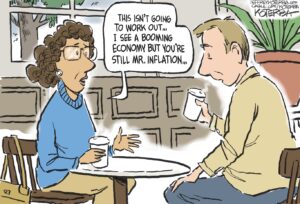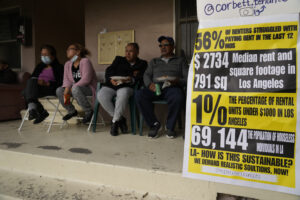Greed by Any Other Name
Opponents of a new law that would make it easier to form unions, including the president and some Republicans in Congress, have found a clever if shameless method of concealing their loyalty to corporate greed.WASHINGTON — The first night that Bill Lawhorn stood outside the Consolidated Biscuit Co. gate with his union handbills, the local sheriff showed up.
“He came out and talked to us,” Lawhorn recalled in an interview. “And once he found out what we were doing, he knew there was nothing he could do about it.”
Management at the McComb, Ohio, bakery — which produces cookies and crackers for big-name brands such as Nabisco — quickly realized it would have to defeat its workers’ effort to unionize without help from the local gendarmes. Union organizers who took legitimate breaks would be told to get back to work or be fired. Supervisors would take one or two workers aside and tell them, “if you vote this union in here, this factory’s going to close and you’re going to be without a job,” said Lawhorn, who operated a forklift at the bakery for 11 years. “Or they would say, ‘If you bring a union in here, you’re going to lose your benefits.’ ”
The workers had overwhelmingly endorsed a union in the spring of 2002 by signing authorization cards. But the lopsided support sparked a determined management effort to sink the union before the official election was held in August. Among the most disconcerting tactics, Lawhorn said, were group meetings in the warehouse, where owner James Appold would tell his employees “about how the unions are bad, that all they want is their union dues, and how if you vote the union in, you’d lose everything you’ve got now.”
On Aug. 15, 2002, the bakery workers voted against the union. On Aug. 16, Lawhorn was fired. Now 50, he supports himself hauling garbage for neighbors and friends. He also depends on his wife’s earnings — and on loans he’s embarrassed to say come from his sons.
The National Labor Relations Board found that Lawhorn’s firing and those of other union organizers were illegal. An administrative law judge said management had engaged in gross misconduct. The authorities ordered Lawhorn and others to be rehired, with back pay. Another, untainted, union election was ordered as well.
None of it has happened. The case still is entangled in appeals.
“Even when the company loses, they win,” says Lawhorn. “I’ve been out (of work) for four and a half years. And the people who still work there, it scared them.”
A Consolidated Biscuit official refused to comment on the case.
On Thursday, the House of Representatives is to consider the Employee Free Choice Act, which would allow a union to be recognized if a majority of workers sign authorization cards. The current system, in which employers can force an election months after authorization cards are certified, has spawned a $4 billion industry of consultants who help business use the period between authorization and the election to thwart the union, organized labor and its supporters say. Research by Cornell University economists shows that three-quarters of employers faced with a union drive hire these consultants. Common tactics include threatening to close plants, forcing employees to attend mandatory meetings where management argues against the union, and making employees meet one-on-one with their own supervisors to hear anti-union appeals. According to the AFL-CIO, illegal employer actions against organizers resulted in 31,358 federal orders for back pay in 2005 alone.
Passage of the card-authorization measure in the House is assured with at least a few Republicans supporting it. Action in the Senate is uncertain.
More clear is the White House response: It intends to veto the measure on the stated grounds that it wants to protect workers’ right to vote in the privacy of a secret-ballot election.
Curiously, this zeal to guard workers’ privacy comes from the same administration that defends electronic snooping on Americans’ phone calls and e-mails without a warrant. It springs up from the masterminds who tried to use the original legislation creating the Department of Homeland Security to strip workers in dozens of federal agencies of their union rights — and deny them civil service protections, too. White House passion for workers’ rights has not, as yet, led the administration to crack down on employer intimidation during organization drives.
Providing an easier route to unionize will not in itself calm the gale-force winds of global economic change that erode the pay and status of everyday workers. It would simply be a small measure of justice — a way to show, perhaps, that our own government will not be yet another weight tipping the scale against those who seek dignity in an honest day’s work.
Marie Cocco’s e-mail address is [email protected].
© 2007, Washington Post Writers Group
Your support matters…Independent journalism is under threat and overshadowed by heavily funded mainstream media.
You can help level the playing field. Become a member.
Your tax-deductible contribution keeps us digging beneath the headlines to give you thought-provoking, investigative reporting and analysis that unearths what's really happening- without compromise.
Give today to support our courageous, independent journalists.









You need to be a supporter to comment.
There are currently no responses to this article.
Be the first to respond.